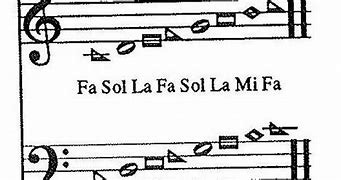Shape Note, or Sacred Harp, singing is a uniquely American vocal style.
Talk about the roots of American Music- this time we’re surely exploring a tap root.
It started in New England as a way to aid those who did not know traditional musical notation: shapes were added to the notes as guides on how to sing the line.
This is for singing without instruments. Many American religious denominations, especially in Appalachia, sing only a capella, as the New Testament describes people as worshiping by singing but does not mention instrumental accompaniment.
As a child, I can remember visiting a non-instrumental Church of Christ with my family.
Ironically, if the idea was to help people who did not read music sound like they did, I think it failed. What it did do was produce a unique vocal sound. It became a staple of Appalachian worship styles.
A one-minute primer on the style (and then an amazing example):
As the style has become endangered, there are revival movements in the American South, American universities, England, Scottland, and Ireland!
It has even been described as an ‘Indie’ genre now; Lord help us.
A relatively contemporary rendition of ‘Wayfaring Stranger.’ The singers first sing the notes then add the ‘poetry’ (the lyrics):
The style also, more organically, lived on by influencing vocal styles in various genres of music, especially some Bluegrass. For instance, Ralph Stanley learned shape note singing in church as a child and its halting, somewhat droning, rhythms can be heard in many of his performances (when he adopts this vocal style, it is pretty much always without instruments):
But if it didn’t really work as far as making people sound like they read music, why did they keep doing it for over 200 years? I think because it sounded cool and did what it was really supposed to do- help people sing together as a community.
Also, it provided the sound that embodied Appalachian experience and identity. Here, I think, is the root of that ‘high lonesome’ sound.
Happy Easter!
He is risen! Alleluia!





Community! Sing! Fill the world with music and mutual aid! Thank you! 🙏
This was eye-opening for me and inspiring. You've led me to pursue further via Youtube a variety of Appalachia videos . Ironically I've given a couple of little concerts in my Greek village singing a capella, predominantly, songs of love and melancholy, one of which was 'A Poor Wayfaring Stranger'. In the repertoire are a couple of the folk songs collected by Cecil Sharp, but not from the Appalachia.. I'm set to explore what are called the love songs, just up my emotional street. I remain of an atheistic disposition but loved the Easter anthem although Bach can give anybody a run for their money when it comes to dancing rhythms. Thanks so much.